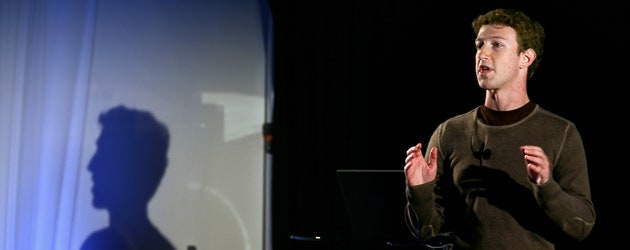Just one month after Facebook launched Beacon, a controversial advertising platform, the company has scaled back its plans and humbly apologized for stomping on its users' privacy.
"I'm not proud of the way we've handled this situation and I know we can do better," wrote Mark Zuckerberg, the 24-year-old founder and CEO of Facebook, in a blog post.
It's been an extremely challenging month for the high-flying social networking site. Beacon, which was meant to revolutionize advertising by allowing users to broadcast purchases they made on outside sites to their Facebook friends, turned out to be many users' ultimate nightmare. Facebook apparently never considered that sometimes people want to keep their shopping habits to themselves.
The crux of the problem was that when users bought things on Beacon-affiliated sites (such as Fandango or Overstock.com), their friends were automatically notified of the purchase. This notification happened before the purchaser had a chance to approve it.
Immediately after Beacon's rollout, privacy lobbyists, left-leaning political groups and thousands of individuals spoke out. MoveOn launched a campaign and complained that Facebook was ruining Christmas; regulators questioned whether Beacon ads were legal in the state of New York, and Facebook users banded together to oppose Beacon.
This isn't the first time Facebook has trampled on users' privacy. When the company rolled out its news -feeds feature in September, 2006, users were outraged that Facebook was broadcasting their updates, profile changes and new friend connections. After weeks of complaints, Facebook finally consented to offer privacy controls so individuals could control whether their activities on Facebook were made public.
This time around, the critics wanted Facebook to make Beacon "opt in" so users would have to explicitly choose to send notifications out, instead of having them sent out by default. Facebook moved slowly to respond to these complaints, and only last week agreed to alter its system. Even then, the system fell short of what critics wanted: Each time users purchased items on a Beacon advertiser's site, they were given the option to stop the notification.
When researchers and security experts dug deeper into Beacon, however, they discovered something even more distressing: Facebook was tracking its users after they'd logged out of the site.
Today, with Zuckerberg's mea culpa, the company has finally agreed to let users opt out of Beacon altogether. Still, it may prove difficult for Facebook to undo the damage done. Jeff Chester, executive director of the Center for Digital Democracy (and an outspoken critic of Facebook, MySpace and Google) was hardly appeased by Facebook's offer to let people turn off Beacon.
"What Mr. Zuckerberg should have said is this: 'We provide a great service and advertising is how we make money. We're going to expand our advertising system in this way, and because of that, we're going to give you more features.' We need transparency," Chester argued.
Still, one has to wonder what exactly it would take to silence the Facebook critics. It's a free site, and people use it with the understanding that it is subsidized by advertising sales. As many commenters on Wired News have observed, people who aren't happy with Facebook don't have to use it.
"I don't think it's that straightforward," Chester argues. "More and more people are actually living on these sites. And this is indicative of how Facebook operates as a digital landlord. These people are not just renters -- they feel they are part owners of a co-op."
